#President Polk
Text
JOHN TYLER
•President Without a Party: The Life of John Tyler by Christopher J. Leahy (BOOK | KINDLE)
•John Tyler: The Accidental President by Edward P. Crapol (BOOK | KINDLE | AUDIO)
•And Tyler Too: A Biography of John & Julia Gardiner Tyler by Robert Seager II (BOOK)
JAMES K. POLK
•Polk: The Man Who Transformed the Presidency and America by Walter R. Borneman (BOOK | KINDLE | AUDIO)
•A Country of Vast Designs: James K. Polk, the Mexican War, and the Conquest of the American Continent by Robert W. Merry (BOOK | KINDLE | AUDIO)
•James K. Polk and His Time: Essays at the Conclusion of the Polk Project edited by Michael David Cohen (BOOK)
ZACHARY TAYLOR
•Zachary Taylor: Soldier, Planter, Statesman of the Old Southwest by K. Jack Bauer (BOOK)
•Zachary Taylor: Soldier of the Republic by Holman Hamilton (BOOK | KINDLE)
•Zachary Taylor: Soldier in the White House by Holman Hamilton (BOOK | KINDLE)
MILLARD FILLMORE
•Millard Fillmore: Biography of a President by Robert J. Rayback (BOOK | KINDLE)
•Millard Fillmore by Robert J. Scarry (BOOK | KINDLE)
FRANKLIN PIERCE
•Franklin Pierce: New Hampshire's Favorite Son by Peter A. Wallner (BOOK)
•Franklin Pierce: Martyr for the Union by Peter A. Wallner (BOOK)
•Franklin Pierce: Young History of the Granite Hills by Roy Franklin Nichols (BOOK)
JAMES BUCHANAN
•Worst. President. Ever.: James Buchanan, the POTUS Rating Game, and the Legacy of the Least of the Lesser Presidents by Robert Strauss (BOOK | KINDLE | AUDIO)
•Bosom Friends: The Intimate World of James Buchanan and William Rufus King by Thomas J. Balcerski (BOOK | KINDLE | AUDIO)
•The Worst President: The Story of James Buchanan by Garry Boulard (BOOK | KINDLE)
#Presidents#Books#Book Suggestions#Book Recommendations#Books About Presidents#John Tyler#President Tyler#James K. Polk#President Polk#Zachary Taylor#President Taylor#Millard Fillmore#President Fillmore#Franklin Pierce#President Pierce#James Buchanan#President Buchanan#Tyler Administration#Polk Administration#General Taylor#Taylor Administration#Fillmore Administration#Pierce Administration#Buchanan Administration#Presidency#Presidential Books
31 notes
·
View notes
Text
The Shocking Redemption Arc of Chester Arthur
To my great pleasure, I get to tell you about Chester A. Arthur. If you don’t know his story, that’s a surprising statement, because most people don’t even recognize his name as one of the presidents. That’s a crying shame, because this guy has the most fascinating character arc of any president I’ve come across so far. He entered the presidency as a despicable, corrupt, conniving political lackey, and left it as--
Well, I’d best get on with the story.
Chester Arthur started out as an idealist. He was the son of an abolitionist Baptist minister, and though he dropped the religion in adulthood, he remained devoted to abolishing slavery. He became a lawyer with a New York firm that argued several civil rights case, and he rose to fame in 1854 when he served as the defense attorney for Elizabeth Jennings, the Northern version of Rosa Parks. Arthur’s victory in her case led to the desegregation of New York City’s public transportation.
During the Civil War, Arthur got an appointment as New York’s quartermaster general. After the war, Arthur returned to civilian life and became a Republican “party man” who worked behind the scenes to draw in voters, funding, and supporters. He and his wife Ellen (called Nell) both loved the finer things in life, which drove Arthur to do whatever he could to gain fame, wealth, and social status.
This is where I need to explain the spoils system. For the first hundred-plus years of American politics, all federal positions were filled by appointment. When a new president came into office, he could award government positions to his supporters--"to the victor go the spoils". Federal employees were required to donate money to the ruling party. There were no requirements for education or relevant experience. Any job could be filled by anyone with the right connections. If you think that sounds like a breeding ground for corruption and cronyism, you’d be absolutely right. By the 1870s, the system was getting extremely corrupt, and there was a growing push for reform.
But not by Chester Arthur. He owed his career to the spoils system. Through his work in the party, he became the right-hand man of Roscoe Conkling, New York’s senior senator and the state’s “political boss”. Conkling was a flamboyant showman, a magnetic politician, and a ruthless man. He had been a major supporter of Ulysses S. Grant’s presidential campaign, so Grant gave Conkling control over all the federal appointments in New York. Conkling used his power to fill positions with his friends and supporters, and he was brutal in attacking anyone who got in his way.
Because Chester Arthur was Conkling’s most loyal supporter, he got the best federal job in the country—Controller of the Port of New York. Before income tax, around 60-70% of federal funds came from the tariffs at this one port. The controller got a salary similar to the president’s, plus he was able to take a percentage of all the fines they levied. At the height of his power, Chester Arthur made $50,000 a year, which is a lot when the average skilled worker at the time made $500. (A rough estimate puts his salary at $1.3 million in today’s dollars.)
Arthur was living the high life. He racked up huge tailor bills. He had a gorgeously furnished house. His job allowed him to force his employees to donate a percentage of their salary to the Republican Party, which gave him even more power within the political machine. He bought huge amounts of wine and cigars that he handed out to people he was wining and dining for the good of the party. His wife resented that he was rarely home because of his political work, but Arthur loved the machine too much to stop.
After his 1876 election, President Rutherford B. Hayes desperately tried to reform the spoils system, but was blocked every step of the way by Roscoe Conkling. Finally, in 1878, Hayes managed to remove Arthur from his position as port controller, under suspicion of corruption, which allowed Arthur to spend more time working for New York’s political machine.
In January of 1880, Arthur was in Albany working for a political campaign when his wife caught pneumonia. By the time Arthur got home, Nell had fallen into a coma, and he wasn’t able to speak with her before she died. He felt guilty over her death, and especially the lack of closure caused by his devotion to politics. But instead of changing his ways, Arthur moved in with Conkling and became more devoted to politics than ever.
Which brings us to the 1880 Republican Convention. The Republican Party was split between two warring factions—the Stalwarts like Conkling who wanted to keep things the way they were, and the Half-Breeds who wanted civil service reform. President Hayes refused to seek re-election (partly because Conkling had made his life miserable) so these two factions somehow had to agree on a new candidate. Conkling supported a third term for Ulysses S. Grant. The Half-Breeds supported James G. Blaine of Maine—who happened to be Conkling’s mortal enemy.
James Garfield was there to nominate John Sherman—the Secretary of the Treasury and the younger brother of the famous Civil War general—and I can’t go any further in this story before I tell you a little bit about him. James Garfield is one of the most ridiculous overachievers in the realm of American politics. He was born into a dirt-poor farming family (he’s the last president ever to have been born in a log cabin). At sixteen, he left home to work on a canal boat, but quit after he nearly drowned, and his mother and brother scraped up enough money for him to go to school. His first year, he paid for his tuition by working as a school janitor. His second year, the school hired him to teach six classes (while he was still a student!) and then added two more because of how popular he was. By the time he was twenty-six, he was president of that same school. He became a lawyer and was elected to Ohio’s state legislature. During the Civil War, he became the youngest person to earn the rank of general. While fighting in the Civil War, his friends put his name in as a candidate for the US House of Representatives, and Garfield won even though he refused to campaign. He then served several terms in the House, where he became popular, but he refused to seek the presidency, because he’d watched several friends become warped by their presidential ambitions.
At the 1880 Republican Convention, Garfield was the more popular Ohio candidate, but insisted he was there only to nominate Sherman. At one point in his nominating speech, Garfield asked the audience, “Now, gentleman, what do we want?” To Garfield’s horror, one man shouted, “We want Garfield!”
Garfield remained loyal in nominating Sherman, but the spark had been lit. The voting went round after round after round for two days, with the votes being split between Grant, Blaine, and Sherman, with no one getting enough to win the nomination. Garfield got one vote in the third round. In the thirty-fourth round, Garfield suddenly got seventeen votes. Garfield stood to protest, saying no one had a right to vote for him since he hadn't consented, but the president of the convention--who was secretly thrilled because he liked Garfield more than any of the other candidates--told Garfield to sit down.
By the thirty-sixth vote, Garfield had won the nomination.
Now they had to choose a vice president. Several of the delegates got the idea to throw a bone to Roscoe Conkling. He was furious that Grant had lost the nomination, and he was vindictive. Conkling controlled New York’s political machine, so without him, the Republicans would lose New York, and without New York, they’d lose the election. He had to be placated. So the delegates nominated Chester Arthur, his right-hand man, as vice president.
Conkling told Arthur to refuse the nomination, but Arthur accepted, saying it was a greater honor than he had ever hoped to achieve. That's putting it mildly. The only position he’d ever held was port controller, and he’d been removed from that. Plenty of people thought nominating him was a horrible idea—a man like Chester Arthur only one step away from the presidency? But other people thought it was a shrewd political move—it would placate Conkling’s faction of the party, and Garfield was young and healthy and would rule in a time of peace. It wasn’t like there was any chance he’d die in office.
After Garfield was elected, Arthur immediately started causing problems. He all but openly boasted of buying votes in the election—which was not a great look when it had been a close race. He was completely on Conkling’s side in his war against Garfield. After Garfield appointed Levi Morton, a Stalwart, as Secretary of the Navy, Conkling sent Arthur and another lackey to drag Morton out of his sickbed--forcing him to drink a bracing mixture of quinine and brandy--and bring him to Conkling’s house to get chewed out, which caused Morton to resign. Conkling forced another Stalwart Cabinet nominee to resign on inauguration day.
Then Conkling went to war over the federal appointments. At first, Garfield placated him, appointing several of Conkling’s candidates. But then Garfield nominated Judge Robertson as Port Controller of New York Harbor. Conkling was livid. That was the prime federal position, a major source of Conkling’s power in the party, and Robertson was one of Conkling’s political enemies. In Conkling’s mind, Garfield had stabbed him in the back. Arthur agreed, and openly bad-mouthed the president to the press.
Conkling and the other New York senator resigned their Senate seats in protest—a dramatic political move. In those days, state legislatures voted for senators, and Conkling believed that since he controlled so many New York politicians, they’d easily get re-elected to their old seats. Unfortunately, the legislature was sick of being under Conkling’s thumb. The election became a drawn-out battle, and Chester Arthur went to Albany to help Conkling in his campaign.
While he was there, the unthinkable happened. On July 2, 1881, James Garfield was shot at a train station by Charles Guiteau, an insane office-seeker. Guiteau had come to the White House every day for months seeking an appointment under the spoils system. When that failed, he decided God wanted him to get Garfield out of the way so the spoils system could continue. After he shot the president, Giteau shouted, “I am a Stalwart, and Arthur will be president!”
As you can imagine, that made things really bad for Arthur. He’d just spent months fighting the president tooth and nail, and the assassin had mentioned his name. Plenty of people thought Arthur had something to do with the shooting. He and Conkling both needed police details to protect them from lynch mobs.
Arthur didn’t want to be president; in his mind, vice president was the perfect job—a position with a lot of political leverage, but no responsibility. He went to the White House hoping to convince Garfield that he had nothing to do with the shooting, but the doctors wouldn’t let him in the room. He managed to speak to the First Lady, where he got choked up with emotion and was observed to be in tears. A reporter later found him in the house where he was staying in Washington, and noted he'd obviously been weeping.
To Arthur’s relief, Garfield seemed to get better. The bullet had missed his spinal cord and all his major organs. If he’d been left alone, Garfield would have made a complete recovery. Unfortunately, his doctors repeatedly prodded the bullet wound with unsterilized instruments, and Garfield fell victim to a massive infection. He lingered for months, slowly starving and rotting to death.
Through all this, Arthur stayed in New York and refused to take up presidential duties; with so many people accusing him of the assassination, he didn’t want to make it look like he was preparing to usurp the throne.
It eventually became clear that the assassin had acted alone, which laid the rumors to rest, but no one wanted Arthur to be president. James Garfield had been a man of the people. The working class considered him one of their own, proof that anyone could rise from poverty and become president. He was an idealist, a champion of civil rights, a family man who lived modestly. For the first time since the Civil War, a president had been supported by both the north and the south, and the country had come together in grief. Chester Arthur was Garfield’s exact opposite—a conniving political lackey who’d become a millionaire through corruption.
James Garfield died on September 19th. To the American people, it looked like their worst nightmare had come true. Conkling’s lackey was in the White House, and now Conkling would rule the nation the same way he’d ruled New York.
Yet, to everyone’s surprise, President Chester Arthur became a completely different man. In one of his first speeches, he listed civil service reform as one of his top priorities—a shocking move for a man who’d become president through the spoils system. Soon after Arthur’s inauguration, Conkling demanded he name a new Controller of the Port of New York. Arthur angrily refused and called Conkling’s demand outrageous. Conkling stormed out in fury and never forgave Arthur. (Arthur did later risk his reputation to nominate Conkling for the Supreme Court, but Conkling, ever petty, refused the position.)
Arthur didn’t have a complete personality transplant. He still lived lavishly, hosting lots of state dinners. He still preferred the social duties of the presidency to actual government work, and he was a hopeless procrastinator. Always fastidious, Arthur refused to move in to the rotting, rat-infested White House until they fixed up the dump, and he ran up extravagant bills during the remodel.
Yet, as a president, he was...respectable. He worked for African-American civil rights. He started a major process of rebuilding and reforming the outdated and corrupt navy. He did sign the Chinese Exclusion Act, but he had vetoed an earlier, harsher version and only signed a much-reduced one (that probably would have been voted in anyway if he’d vetoed it). That remodel of the White House, even if it ran over-budget, was long overdue.
Most shocking of all was his unswerving devotion to civil service reform. He continued an investigation into a government postal scandal, even though everyone assumed he’d drop it. He voiced his continuing support for reform efforts. In 1883, Arthur signed the Pendleton Civil Service Reform Act. As written, the act required only 10% of federal jobs to be assigned based on merit, and even that required the president to take action to enforce it. People assumed that Arthur would sit back and do nothing, so the spoils system would remain in place. Yet Arthur immediately formed a commission to enact the reform, even appointing some of his old enemies. The man who’d benefited most from the spoils system became the one to finally destroy it.
How do we explain such a complete and sudden change? Part of it’s a matter of personality. If I can indulge in a bit of meta, Chester Arthur seems to be a textbook example of the sanguine-phlegmatic temperament—someone who wants to fit in with the crowd, to go with the flow. As a political lackey, this made him self-serving and amoral, but as president, the crowd he had to impress was the American people. After months of getting crucified in the press, with tons of articles saying what they didn’t want him to be, he’d have plenty of motivation to become what they did want him to be.
A more important motivation, though, was death. His wife’s death was likely the first shock that would make him step back and take stock of his political career. Garfield’s death had an even more profound influence on him. The spoils system had led a madman to murder a president in Arthur’s name; if anything could motivate a man to change the system, that would be it. Even more profound than that was his own death. Not long after entering the White House, Arthur was diagnosed with a fatal kidney disease. He hid the diagnosis during his term, but his actions in office were the actions of a man doomed to die, with a mind toward the legacy he’d leave behind.
Yet there’s another stranger, more mysterious influence that I’ve left to last because of how cool the story is. The day before his death, Chester Arthur—who’d become ashamed of his old life—asked a friend to burn the vast majority of his papers. Years later, among the papers that had been spared, his grandson uncovered a packet of twenty-three letters from a 31-year-old invalid named Julia Sand. Julia came from a family very interested in politics, and her illness meant that she spent a lot of time reading the newspapers, so she was familiar with Chester Arthur’s political career. In August of 1881, she sent Chester Arthur a letter that began, “The hours of Garfield's life are numbered—before this meets your eye, you may be President. The people are bowed in grief; but—do you realize it?--not so much because he is dying, as because you are his successor.” Over seven pages, Julia scolded Arthur for his corrupt ways, but assured him of her faith in his better nature, and urged him to reform. She sent letters over the next two years, full of encouragement and scolding and political advice. She called herself his “little dwarf”, because her lack of ties to him meant she could be completely honest with him.
There’s no evidence he ever answered her. But she did offer some rather specific political advice that he seems to have followed. And he did visit her once. In 1882, he stopped by her house in the presidential carriage, surprising her and her family (who had no idea she’d been writing to the president) with an hour-long visit. She seemed to grow more frustrated with his lack of answers after that, and no letter exists after 1883.
There’s no way to say what kind of effect the letters had on him. But amid all the turmoil after the assassination, it must have meant something to have one voice saying she believed in him. She was a voice from outside the Washington political machine, who could serve as a sort of conscience. The fact that those letters survived when so much else burned suggests he considered them worth saving.
No matter the reason, the truth remains that Arthur entered the presidency as an example of all that was dirty and loathsome in the political system, and he left it as a respectable man. In giving up his old ways, he sacrificed connections he’d spent years building. His old friends never forgave him, and his old opponents never quite trusted his reform, yet he did what he thought was right even if it meant he stood alone. In summing up his presidency, I don’t think I can do better than contemporary journalist Alexander McClure: “No man ever entered the Presidency so profoundly and widely distrusted as Chester Alan Arthur, and no one ever retired... more generally respected, alike by political friend and foe.” I think that deserves to be remembered.
#history is awesome#presidential talk#i apologize but i really can't see any way to cut this down#i like the detour into garfield's nomination#i can't cut conkling out any more than i have#i can't leave out his wife#i didn't even mention that he was washington's most eligible bachelor during his term but he remained faithful to her memory#or that his sister served as hostess at the white house and helped raise his daughter (who he protected from the press as best he could)#or that he did make a half-hearted attempt to seek re-election so people wouldn't think he was slinking off in disgrace#and there was some support for him#but he didn't mind at all when someone else was nominated because he was dealing with his kidney disease#and he died in 1886#which means he had the shortest post-presidency life of anyone except james k. polk who died three months after leaving office#i did not come into last week thinking that by the end of it i'd have developed a minor specialization#in the presidency of a guy i knew only for his facial hair and his half-verse in the animaniacs song#i didn't even mention the facial hair!#go to wikipedia and see his glorious muttonchops!#say what you will about the victorians but they had wild facial hair game#but anyway here is the life story of my impeccably dressed trash panda son#who is put together on the outside and a mess on the inside#and still manages to maintain a certain dignity despite how pathetic he is#he's a mess of a human being but i love him your honor
31 notes
·
View notes
Note
I’ve noticed that Linnell’s been posting a lot about US presidential history on his Instagram lately, and as a fellow history enjoyer I just want to ask him: who’s his favorite out of the first 30 US presidents, and why?
JL: I get the feeling that someone has to be a little wrong in the head to successfully pursue the office of president. Picking a favorite implies endorsing them, so I should say up front that I’m suspicious of anyone with that level of ambition. But I find all of them interesting and getting to know them gives you a kind of scaffolding for understanding U.S. history, which is good.
I’m impressed by someone like John Quincy Adams, who maybe had an unremarkable four years in office but was a brilliant diplomat, spoke a whole bunch of languages, studied the classics and travelled around the world when he was young. So jealous! Long after he was president he continued to hold public offices and was a strong opponant of slavery and the Mexican War. So he earns lots of points.
109 notes
·
View notes
Text
James K Polk’s diary contains an entry where he talks about not wanting to eat the food at a dinner and quietly asking someone to try and find his comfort food.
#I have never related to a long dead president more#okay he didn’t eat it because he didn’t trust it and was already feeling sick but still relatable#james k polk
9 notes
·
View notes
Text
Nothings quite as funny to me as shit that's just wrong and confusing



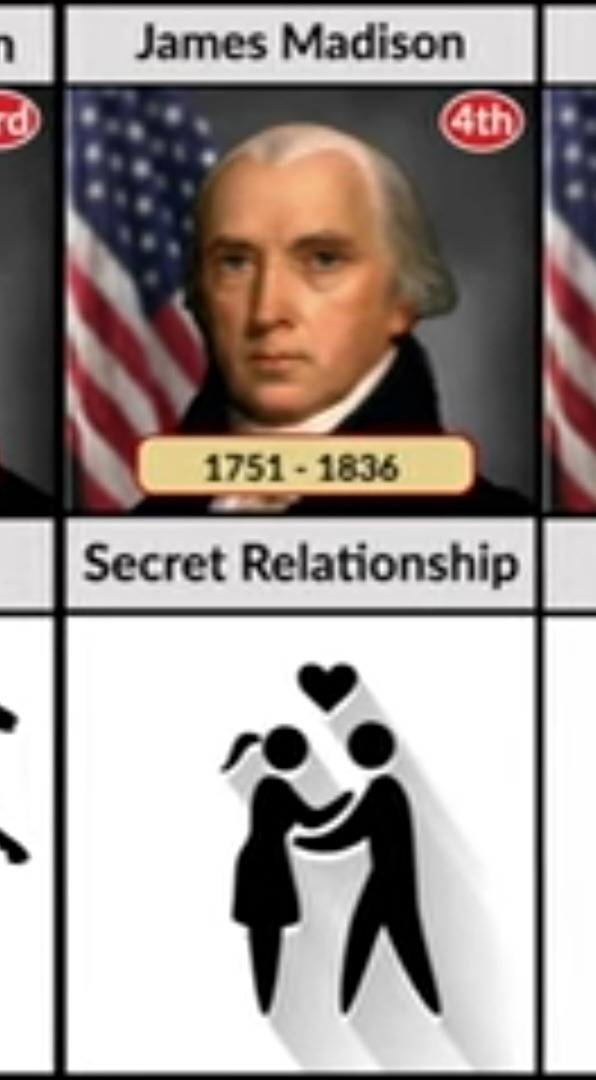


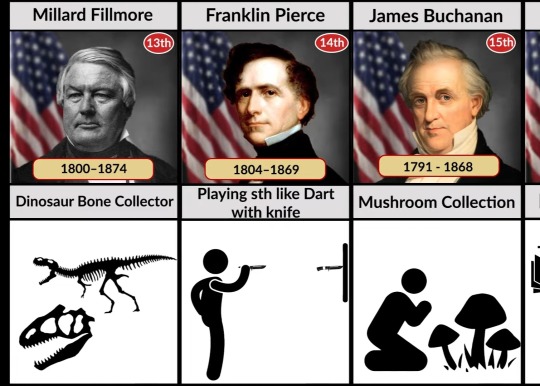
#fillmore gets to be there twice because i like both screenshots as they are#acctag: presidents#btw the screenshots are from a yt channel called Testa Data Comparison#idk why its called that#“playing something like dart with knife” kills me#old hickort#millard fillmore#james buchanan#jaxler#matty van#william henry harrison#zachary taylor#p james k polk c#franklin pierce
7 notes
·
View notes
Text
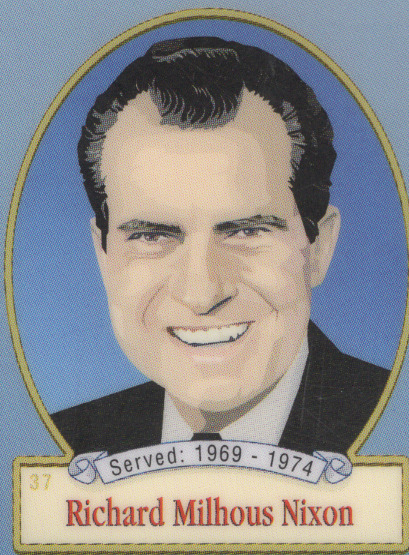

#Poll#President#Presidents#President of the United States#US President#Presidential Poll#America#Tumblr Poll#Tournament Poll#Richard Nixon#James Knox Polk#Note: we do NOT own this artwork
2 notes
·
View notes
Text
Requests art !
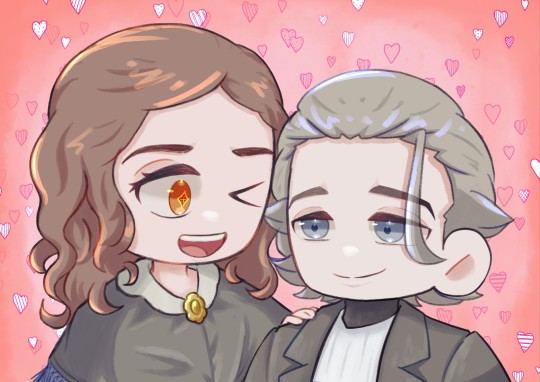
Polk and his wife Sarah
I'm sorry I was extremely late and slow on this request...
I have nothing to say but sorry for making you wait so long...
But I hope you like this 🥺
@antebellumbitch
12 notes
·
View notes
Text
Presidential Man Slut Poll Round 1

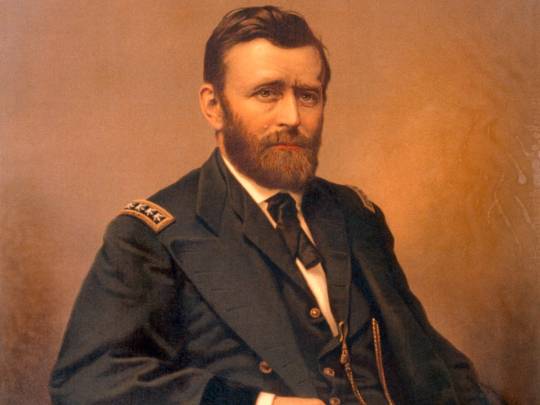
Vote for who you think has the absolute sluttiest vibes! Learn more at the FAQ. This poll ends on Saturday, 25 February 2023.
Remember to reblog to make sure everyone gets a chance to vote. That’s democracy, babey!!!!
8 notes
·
View notes
Text
presidentialus dickolas?
#franklin pierce#millard fillmore#george washington#bill clinton#gerald ford#ronald reagan#james k polk#president talk#george w bush
5 notes
·
View notes
Text
Reblog this if you want
#james k. polk#zachary taylor#millard fillmore#franklin pierce#james buchanan#abraham lincoln#andrew johnson#ulysses s. grant#rutherford b. hayes#james a. garfield#us presidents
6 notes
·
View notes
Text
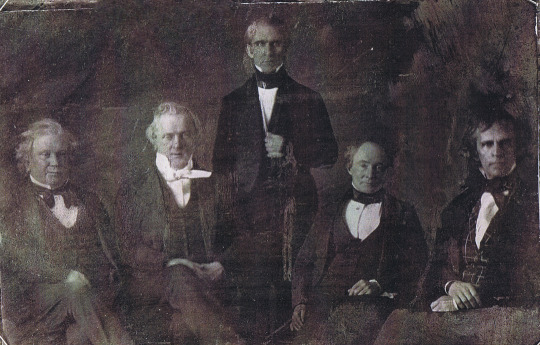
"I had learned this morning that Mr. Buchanan had taken exception to my remark on Saturday last that I should feel that I was deserted by my political family if the members of my Cabinet should call on the President-elect before he called on me. The remark was made because it might have happened that if my Cabinet called on General Taylor he might not afterwards have chosen to call on me at all. As General Taylor belongs to a different political party from myself, and as it was his duty to call on me, if he desired to exchange civilities, I thought it was due to their own self-respect as well as to me that my Cabinet should wait until General Taylor paid his respects to me before they paid their respects to him. In this view all the members of the Cabinet expressed their concurrence on Saturday, except Mr. Buchanan. I learned this morning that Mr. Buchanan had said to a member of the Cabinet that notwithstanding my remark on Saturday he had left the Cabinet-room resolved to call on General Taylor on that day, as General Shields by appointment had called at the State Department to accompany him. He did not, however, do so; but called on General Taylor yesterday, immediately after General Taylor had called on me. Mr. Buchanan is an able man, but is in small matters without judgment and sometimes acts like an old maid."
-- President James K. Polk, on his Secretary of State James Buchanan, shortly before the inauguration of Polk's successor, President-elect Zachary Taylor, in an entry in Polk's remarkable and often immensely petty personal diary (which he religiously updated throughout his Presidency), February 27, 1849.
#History#Presidents#Presidential History#Presidential Quotes#Quotes by Presidents#James K. Polk#President Polk#Polk Administration#James Buchanan#President Buchanan#Zachary Taylor#General Taylor#President Taylor#Inauguration of Zachary Taylor#Presidential Transitions#1848 Election#Politics#Political History#Political Quotes#Political Rivalries#Presidential Rivals#Presidential Rivalries#Presidential Feuds#Presidential Relationships#Diary of James K. Polk#Presidential Diaries#Cabinet of James K. Polk
16 notes
·
View notes
Photo
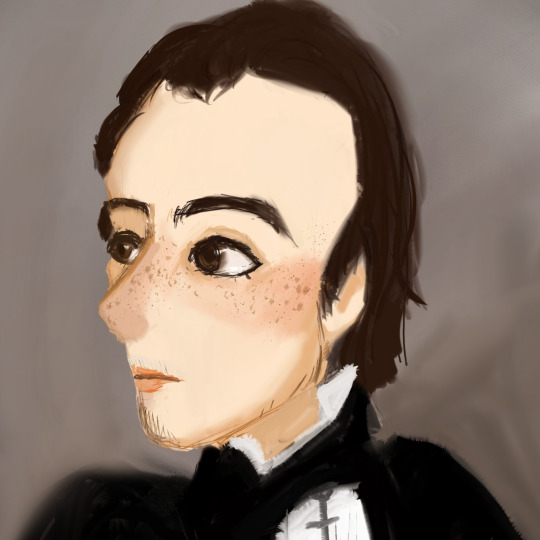




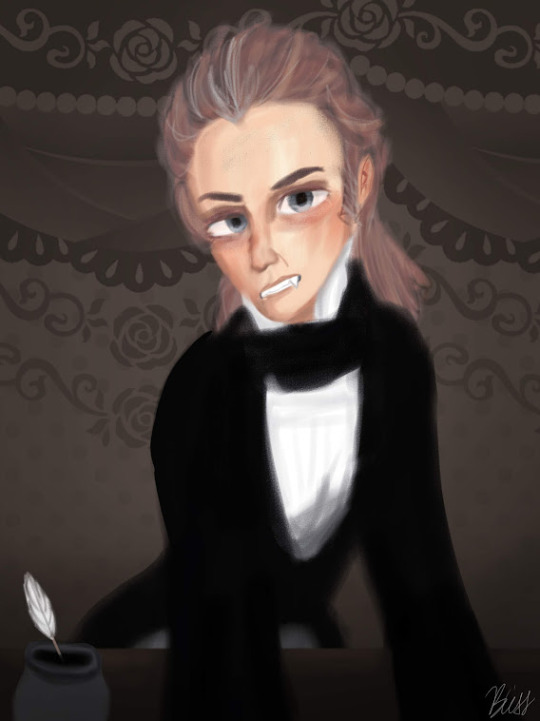
Art dump, like a MASSIVE art dump. The image with the flowers is a gift for my friend @stims-the-jester and the furry is my oc. Also the image with the crying blood eyes is from a roleplay of Demonic Andrew Jackson, don’t question it. The top one is my oc Aaron. The others are Jackson and Polk.
4 notes
·
View notes
Text
Presidents from Tennessee

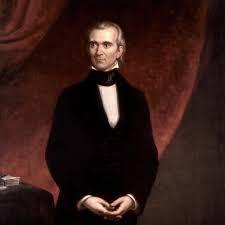

Did you know that there were three presidents that lived in Tennessee? Their names were Andrew Jackson, James K. Polk, and Andrew Johnson.
1 note
·
View note
Text
2021: North Carolina Road Trip - James Polk Presidential Museum
The next stop on our trip was at the James Polk Presidential Home and Museum, in Columbia, Tennessee. We were at this small location for about 2 hours and had a guided tour which was very well done. For history buffs this is a great location but might be difficult for small children. The tour does include climbing some steep stairs as well.
I chose papers that looked antique for this spread, and…
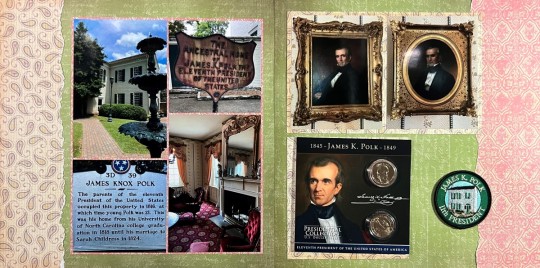
View On WordPress
#columbia#Home#James Polk#MASCrapping#masculine scrapbooking#Museum#President#presidential#quarters#ScrapBook#scrapbooks for men#Tennessee
0 notes
Text
shoutout to They Might Be Giants for writing very few songs about romance and instead making music about cool, relatable stuff like being a drum-playing fake doctor/real worm, former us president James Knox Polk, a statue that makes you die, or wanting to buy a big prosthetic forehead and wear it on your real head
14K notes
·
View notes
Text

some doodles of JP and Buchanan
The red haired guy is Andrew Jackson😌
21 notes
·
View notes